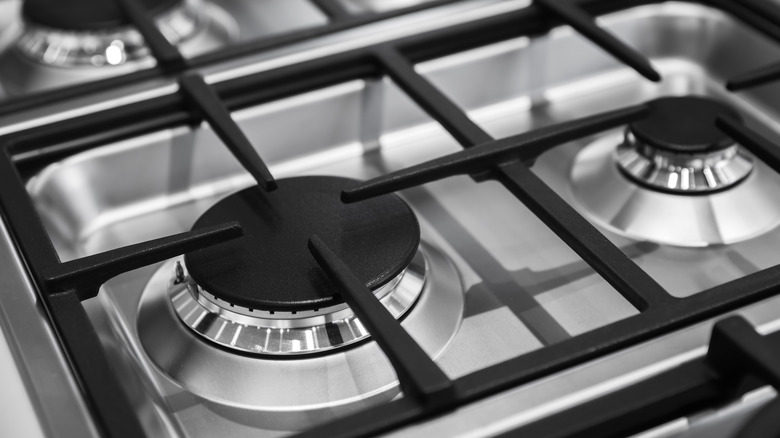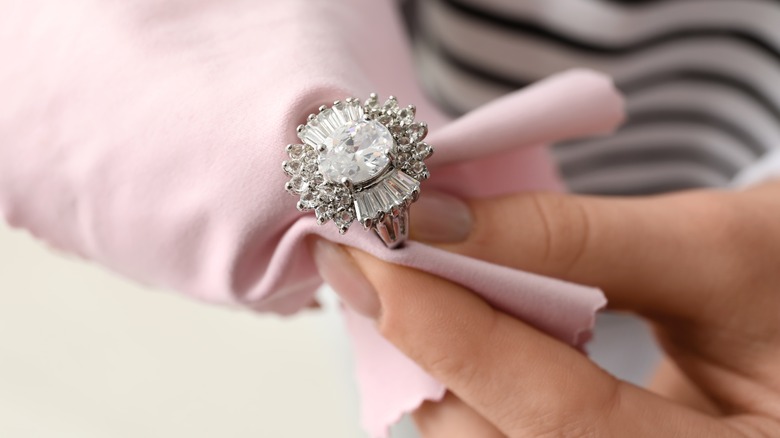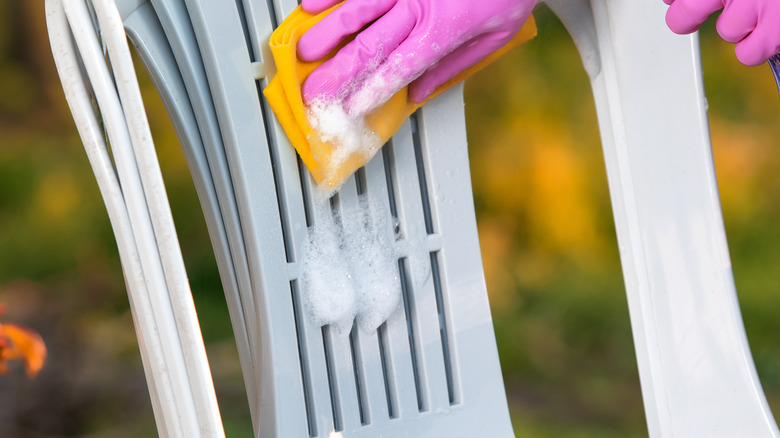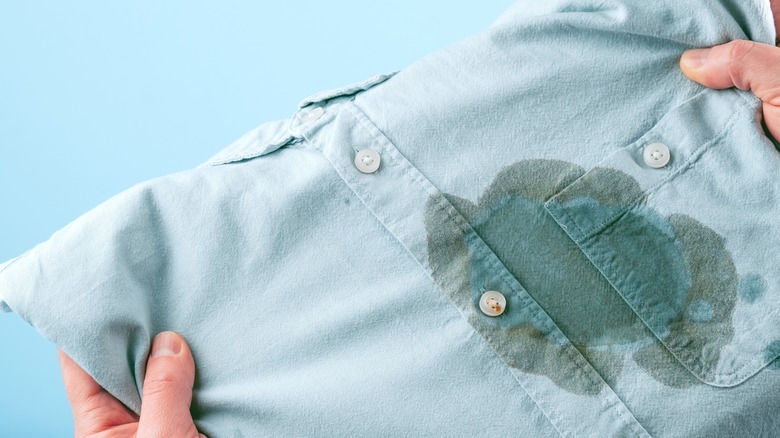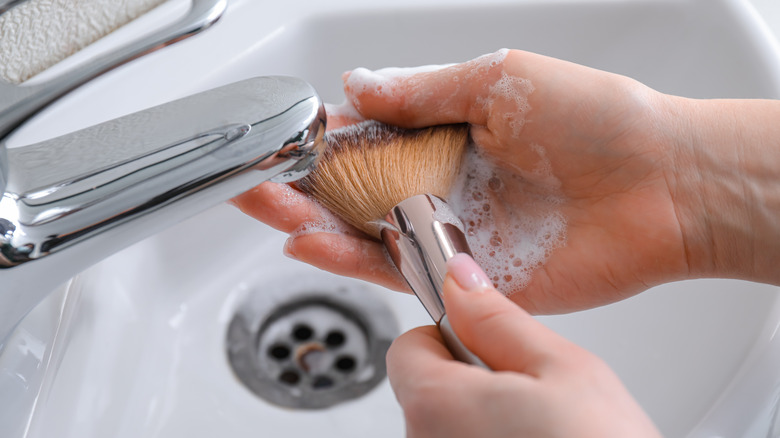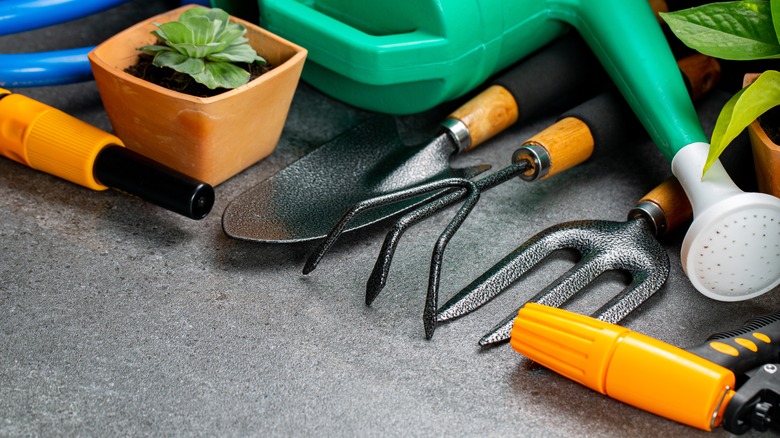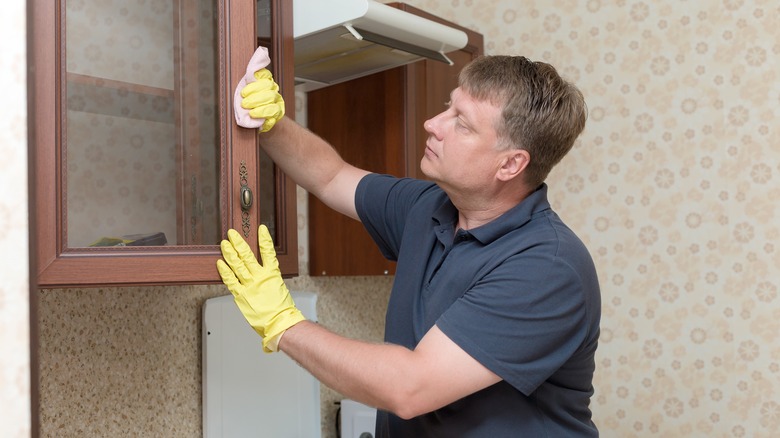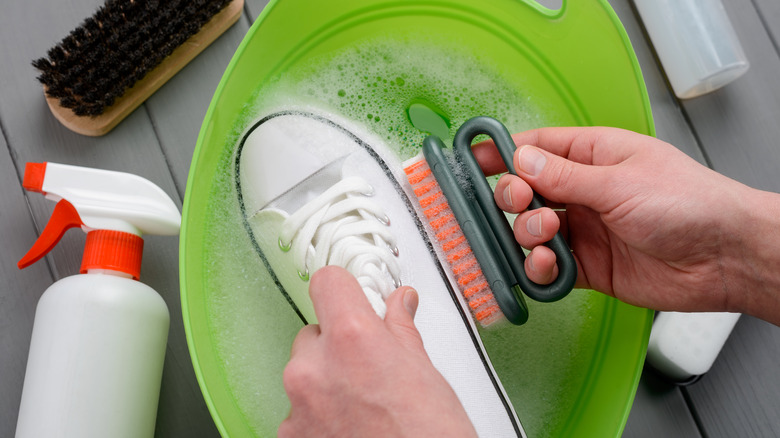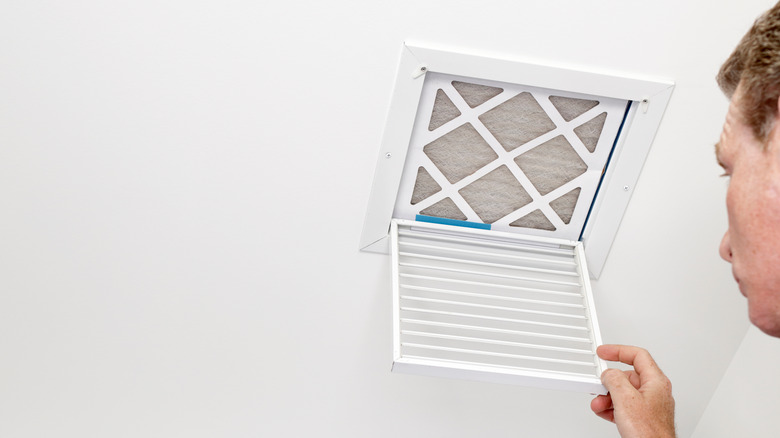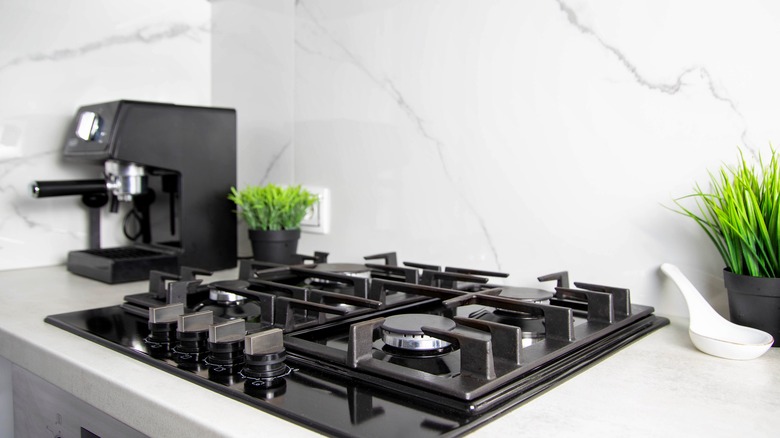12 Unexpected Things You Can Clean With Dish Soap
To tackle cleaning chores around the house, opening your cupboard or storage space and seeing a host of specialized cleaners for different tasks around your home is common. However, dish soap is a surprisingly versatile tool you'll find in most households, and many people overlook it and go with a specialized option. However, the soap you trust to get grease and grime off your dishes also works wonderfully to clean a host of unexpected items around the house, including things you may not consider. These items range from tools to jewelry and everything in between.
It's common to think more is better when tidying up, but one accessible product can replace many cleaning agents. Along with decluttering your cupboard or storage space, dish soap allows you to rethink how you approach your cleaning routine. By using it to tackle your tough cleaning challenges, you're saving money and reducing waste, which is an eco-friendly approach to keeping your home sparkling and your items spotless. Whether you want to remove tough grease stains on fabric or ensure your gardening tools are ready to go in the spring, dish soap is powerful.
Clean buildup from jewelry
You want your pretty jewelry pieces to sparkle and shine when you wear them, especially your precious stones or pearls, and dish soap can help them look their best. It's a great way to effectively clean your more intricate pieces without using chemicals, reducing the chances of damaging them. Your delicate bracelets, rings, and necklaces can build up a layer of dirt, body oil, and grime, dulling their natural shine. Many people think you need traditional jewelry cleaner to get these pieces clean, but some of these cleaners may be too harsh for certain stones. Dish soap is unexpected yet effective. Its gentle formula is perfect for materials that require careful handling, like precious gemstones. To use it, dip your jewelry in warm water with a few drops of dish soap, let it soak for 15 to 20 minutes, and gently scrub it with a soft cloth. Rinse them well and let them dry. However, be aware that dish soap or cleaners containing bleach, or citric or acetic acids could damage fine jewelry, especially pearls. Choose a mild formula without any moisturizing agents that can leave a film.
Dish soap works because it loosens the layers of grime and dirt that naturally build up with wear. The mild but effective cleaning agents break down buildup and oils. When you wipe or gently scrub your jewelry, you work the dish soap into all the small areas, further loosening the grime so that you can rinse it away.
Clean outdoor furniture before storing
As the seasons turn cooler, your plastic, metal, or wooden outdoor furniture starts to show signs of wear from being in the elements. Dirt, pollen, and bird droppings can all stick to the furniture's surface, making them less inviting to relax in and potentially shortening their lifespan. However, dish soap is an effective cleaning solution for each material, proving that you don't necessarily need outdoor-specific cleaners to tackle this project. To clean them, get a bucket of warm water and enough dish soap to make suds. Use a sudsy rag, sponge, or soft-bristled brush and scrub your outdoor furniture to remove any visible dirt and grime. However, to clean wicker furniture, limit the amount of soap and water you use to avoid material breakdown, cracking, or peeling.
The balanced dish soap formula is the key to why it's so effective for cleaning your outdoor furniture. It will get rid of grease and grime without harsh chemicals, making it perfect to banish buildup without damage. The mild properties ensure excellent results without any harmful residues or films that can harm the material. Soap also emulsifies dirt and oil, allowing you to easily rinse them away before storing your pieces.
Remove oil stains on clothing
Trying to remove oil stains from clothing can be tedious, but dish soap can help move the process along. It's something a lot of people skip because they assume you need to pre-treat with a specialized product. However, to lift an oil stain from clothing, lay the piece flat, add a few drops of dish soap onto the stain, and gently work it in, using a soft brush until it penetrates the fibers. Leave it alone for 10 to 15 minutes to break down the oil, and rinse it in cold water before you wash it as usual. To ensure the dish soap doesn't discolor or damage the fabric, spot-test a hidden area before using it on the stain. Also, pick a mild, dye-free, and fragrance-free dish soap to minimize the risk of damage or skin irritation.
Dish soap — with its formulation containing surfactants — comes designed to get greasy oil off surfaces. Surfactants reduce the tension between the fabric and oil, and this helps the dish soap get into the stain and lift it from the fibers. This is precisely how it works on dishes, targeting and dissolving the oil to leave your dishes clean. Also, putting dish soap right onto the greasy stain gives you a targeted approach to removing stains without having to soak the entire garment.
Remove oil- or cream-based makeup from makeup brushes
Keeping your makeup brushes clean ensures they last longer and makes for a more hygienic routine each time you use them. Over time, products build up on brushes, especially if you use cream- or oil-based makeup. This buildup impacts how well they work while also being a breeding ground for bacteria. While you can reach for cleaners specifically marketed for personal care or cosmetic tools, you can also use dish soap. To clean your makeup brushes, gently wet the bristles under cool water, keeping the handle as dry as possible. Drip a few drops of dish soap onto your palm and gently swirl the brush to create a lather. Rinse them under running water until the water runs clear, and squeeze out any excess. Shape the bristles before laying the brush flat to dry. Do this roughly once a week for the best results.
Dish soap works to clean oil- or cream-based makeup from brushes the same way it works on dishes. Dish soap's surfactants break up oil and water, allowing it to gently pull cream, oil, and pigments out of the brush's bristles. This is very important as it helps keep your makeup brushes functioning since allowing residue to build up can lead to uneven application. Additionally, regular cleaning with dish soap helps preserve the bristles' softness and shape, extending the life of the brushes.
Clean your garden tools to make them last longer
Garden tools allow you to create a thriving backyard or garden space, but they can build up sap, soil, and a layer of rust, making them more prone to breaking down and reducing their effectiveness. To clean your garden tools, first use a brush or rag to knock away any loose dirt. Get a bucket and add lukewarm water and a few drops of dish soap to create a mild cleaner. You can submerge smaller tools into this mixture and let them soak for 10 to 15 minutes, but you'll want to wipe larger tools down with dish soap and a water-soaked cloth. After washing, rinse and dry them. For added protection, you may want to spray on a light oil coating to protect against corrosion.
The buildup of dirt, rust, and sap may seem like they'd require a heavy-duty cleaner, but dish soap is often enough. The cleansing agents in the formula get into the sap and soil residues on your garden tools, and this helps you wipe them away without having to work at it. This is particularly important for tools with sticky sap because it can be challenging to strip away. Also, dish soap works on different materials without causing damage, including wood, metal, and plastic, helping you keep all your garden tools in prime shape.
Wipe down kitchen cabinets to remove grease
When you cook, especially if you fry foods, it's easy to splatter your kitchen cabinets with grease, which eventually builds up and makes your cabinets look dull or sticky. You may think you need a strong degreaser or a kitchen-specific cleaner to eliminate it, but dish soap works. To use this tip to clean your kitchen cabinets, mix warm water with dish soap and gently scrub your cabinet's surfaces with a soft cloth roughly once a week. It'll remove the fine layer of grease without damaging the finish. Afterward, rinse them with a clean, damp cloth before wiping them dry. However, if you have wooden cabinets, be sure to use a damp rag instead of a soaked one to prevent warping or damage. Rinse well to avoid getting stuck with a soapy residue.
Dish soap works well for this project because it is designed to fight oil and fats, and it has degreasing properties with a mild formula that removes the stubborn residue that builds up from cooking. The surfactants lift the grease, making it easy to wipe away. It does all of this without harsh chemicals that could damage your pretty finish on the cabinets or pose a health risk when preparing food. It's also cost-effective because you don't have to run out and buy a specialized degreaser when you're ready to clean the cabinets.
Wipe refrigerator interiors to remove food buildup
Your refrigerator is one area that you might not expect to hide messes that could negatively impact the quality of the food you store in it and how well your appliance runs, but it can. Crumbs, spills, and food buildup make the interior look dirty, leading to smells and bacteria growth. Deep cleaning your refrigerator may seem like a huge task that needs the help of specialized or antibacterial cleaners, but dish soap will do just fine. Empty everything out of your refrigerator, and pull out the drawers and shelves. Dilute a few drops of dish soap into a bowl of warm water and wipe down the entire inside of your refrigerator using a soft cloth dipped into this mix, ensuring you get the shelves, walls, and compartments to eliminate any spills or food residue. To finish, go back over everything with a damp, clean cloth to get the refrigerator ready to store food.
Dish soap has effective but gentle cleaning properties, making it an excellent choice for this project. It cuts through spills or stains inside your refrigerator like it does grease on dishes, and it'll emulsify any oils, fats, or food buildup so that you can wipe them away without using strong chemicals or harsh scrubbing. Using dish soap also reduces your chances of damaging the interior, thereby extending the life of your refrigerator.
Remove dust from ceiling fans
Figuring out the best way to clean your ceiling fans can be challenging because they build up dust between cleaning sessions. When you switch them on, the dust circulates throughout your room, impacting air quality. But you don't need a cleaning service or special tool to clean them; using a mix of dish soap and warm water will remove the grime. Switch your fan off and make sure it's stopped moving before cleaning. Mix a few drops of dish soap into a bucket of warm water, dip a cloth into the mix, and gently wipe down each blade, ensuring you get both sides and the edges. Use a damp cloth, not a wet one. Take a second cloth and dry the blades. A second cleaning option is to remove the blades, soak them in soapy water, dry them, and then put them back on.
Dish soap works to get rid of dust because the surface-active agents trap oil and water, and encapsulate dirt particles so that you can wipe them off. It's gentle on the fan's housing, and you can use it on various materials without stripping the finish.
Clean shower curtains monthly
Shower curtains aren't usually something you clean every day, but forgetting to clean them at least once a month or so allows soap scum and hardwater stains to build up, making them look dingy and dirty. While you do need a stronger cleaner to address issues like mold or mildew growth, dish soap works well to get rid of more minor issues like soap scum or general grime. Take your shower curtain down, and lay it flat or hang it up outside. Fill a bucket with warm water and a little dish soap, and use a soft cloth to put it on the shower curtain, scrubbing at buildup. Leave the soapy water for 20 to 30 minutes for stubborn spots and rinse it to finish. Ensure it's dry before rehanging it to prevent mold and mildew growth. You can also soak and scrub it in the bathtub with soapy water to keep your floor from getting wet.
Dish soap will break down soap scum and general grime the same way it does grease and buildup on dishes. The surfactants get into the stains and help break their bond with the shower curtain, making it easier for you to scrub them before rinsing away any residue. It also cleans different materials — including fabric, plastic, or vinyl — without damage.
Clean scuffs, dirt, and deodorize sneakers
Cleaning your fabric shoes or sneakers is vital because they build up scuffs, dirt, stains, and odors. While you may think you must use specialized cleaners, you can get away with a simpler method for many issues that make your shoes look grimy. To get rid of dirt and scuffs, as well as deodorize, first use a soft brush to remove any excess dirt. In a bowl, mix warm water with dish soap, and use a soft brush to gently scrub at any spots on your sneakers. Use a toothbrush dipped in soapy water for harder-to-reach spots like your insoles. Wipe them down with a damp cloth when you finish to get rid of all the soap, and then place them somewhere sunny to air dry vs. putting them in your dryer. This prevents the fabric from shrinking or warping.
You can use dish soap for this project because the formula gets to the whole stain and starts dissolving the bonds it has with your shoe's fabric or rubber components. As you scrub, you work the soap in and break up the stains so that you can rinse them away. The formula is gentle enough to use on most sneakers — including mesh, canvas, or synthetic fabrics — without damaging them. It's also an easily accessible product, making it cost-effective over more traditional sneaker cleaners.
Soak vent covers to remove dust and grime
Your vent covers help keep your indoor air circulating, but it's easy to skip them when you clean. Over time, grime, dust, and allergens build up, negatively impacting your indoor air quality and how well the vents work. An effective way to clean your air vent covers without using strong chemical-based cleaners is to soak them in dish soap and warm water. Carefully unscrew the vent covers, fill a tub with warm, soapy water, and submerge the covers. Give the soap at least 30 minutes to loosen the grime and buildup before gently scrubbing the covers with a soft brush or cloth. Rinse them under running water to remove any soapy residue that could leave a film. Before you reattach them, make sure they're completely dry to prevent dust from clinging to the surface.
Dish soap is an effective cleaner on metal or plastic air vents because it loosens and lifts dirt away. You don't have to scrub as hard and risk damaging the vent's surface. Also, it's safe to use dish soap on different materials without worrying about causing damage, including plastic and metal. The soaking process is the key to maximizing your work because this gives the dish soap time to do its job.
Remove burnt-on food and grease from cast iron grates
Cast iron grates are the workhorses of kitchen cooktops, routinely being exposed to heavy pots and high heat, leading to stubborn grease and burnt-on food. Cleaning cast iron stove grates might seem like it requires abrasive scrubbing pads or harsh chemicals, but dish soap is a safe alternative. To tackle the grime, remove the grates from the cooktop and submerge them in hot water mixed with a generous squirt of dish soap. Let them soak for at least 15 to 20 minutes, or even longer for particularly stubborn grime. This soaking process loosens the burnt-on food and grease, making it easier to clean the grates with a non-abrasive brush or sponge. When they're done soaking, scrub lightly with a sponge or brush and rinse them well. Allow them to completely dry before putting them back to avoid rust and corrosion issues.
Dish soap's effectiveness in cleaning cast iron grates lies in its grease-fighting formulation. Cast iron, known for its durability and heat retention, often accumulates burnt-on food and grease that can be challenging to remove. Dish soap, designed to break down and emulsify fats and oils, penetrates this stubborn residue, softening it for easier removal. The surfactants in dish soap act on the grease and burnt food, lifting them from the cast iron's porous surface without the need for harsh chemicals or abrasive scrubbers that could damage the grate's seasoning or finish.
